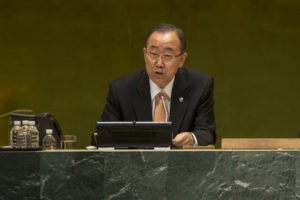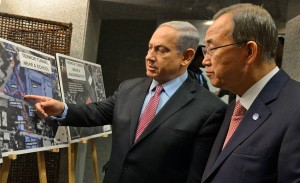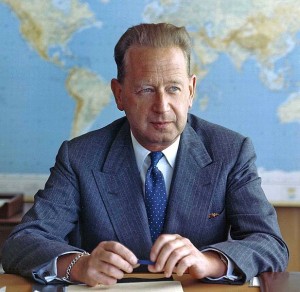Even as much of the world bridled at the U.S. pretensions of “unipolar” power, U.N. Secretary General Ban Ki-moon toed Washington’s line and further undercut the U.N.’s supposed evenhandedness, writes Joe Lauria.
By Joe Lauria
After ten years of almost total obedience to Washington, Ban Ki-moon stepped down Sunday as United Nations Secretary-General, leaving behind a sorry legacy that has undermined the U.N.’s legitimacy, which rests on its real and perceived neutrality in overseeing world affairs.

Secretary-General Ban Ki-moon delivers remarks during the special Sustainable Development Goals (SDGs) segment. Sept. 20, 2016 (UN Photo)
The U.N.’s second secretary-general Dag Hammarskjold defined the job’s role as a diplomat who has the ability and courage to navigate a course independent of the major powers and in defense of the world’s population.
“The right of the Secretariat to full independence, as laid down in the Charter, is an inalienable right,” Hammarskjold said shortly after his election in 1953. The U.N.’s purpose, he said, was not to submit to the major powers but to seek “solutions which approach the common interest.”
Despite his elite background, his defense of the “common interest” distinguished Hammarskjold and alarmed many of the world’s elites who wanted a more pliable secretary-general who would reliably take their side, especially in management of the Third World. After only one year in office, he condemned the U.S.-led coup in Guatemala that overthrew a democratically elected president. No secretary-general since has publicly criticized a CIA covert operation.
Hammarskjold’s championing of the common interest of Africans and other colonized people put him at odds with the white rulers of apartheid South Africa as well as colonial Britain and the United States.
“The discretion and impartiality required of the Secretary-General may not degenerate into a policy of expedience,” Hammarskjold responded.
When he also angered the Soviet Union, which demanded his resignation, he responded: “It is very easy to resign. It is not so easy to stay on. It is very easy to bow to the wishes of a Big Power. It is another matter to resist.”
By navigating an independent course amid the major powers, Hammarskjold set the standard for the job of secretary-general – and, as I reported in 2014, it may have led to his death in a mysterious plane crash on Sept. 18, 1961, during a conflict over mineral-rich Congo.
Bending to Power
No other Secretary-General has come close to Hammarskjold’s independence or his inventiveness in creative peacekeeping and personal mediation. The few others who tried to follow in his footsteps also found their U.N. careers cut short. For instance, Boutros Boutros-Ghali’s insubordination to Washington in defending developing countries in the face of America’s post-Cold War, unilateralist expansion into spaces vacated by the Soviet Union cost him a second term. He had the temerity to tell Madeleine Albright, then the U.S. ambassador to the U.N., that Washington was his “problem.”
“Coming from a developing country,” Boutros-Ghali wrote in his memoir, “I was trained extensively in international law and diplomacy and mistakenly assumed that the great powers, especially the United States, also trained their representatives in diplomacy and accepted the value of it. But the Roman Empire had no need of diplomacy. Neither does the United States.”
Others learned their lesson. Boutros-Ghali’s successor, Kofi Annan, the only sub-Saharan secretary-general, was a major proponent of U.S. initiatives, including the controversial “responsibility to protect” doctrine of military intervention (as applied in Kosovo) and a U.N. partnership with private corporations, the so-called Global Compact, ultimately giving U.N. cover for neoliberal and multi-national misdeeds.
Though a darling of Washington, Annan got himself into hot water when he admitted to an insistent BBC interviewer that the 2003 U.S. invasion of Iraq was “illegal.” The Bush administration made the remainder of his second term miserable and tried to pin the Oil-for-Food scandal on him, though it was a program run by the Security Council.
By contrast, Ban, a South Korean, was seen by the Americans as their man from the start. We “got exactly what we asked for,” an administrator and not an activist, said John Bolton, America’s irascible U.N. ambassador when Ban was elected in 2005. The U.N. charter doesn’t call the secretary-general “president of the world” or “chief poet and visionary,” Bolton said sarcastically in an interview with me and a colleague for The Wall Street Journal.
Ban said his “biggest blunder” until then had been in 2001 when, as South Korea’s chairman of its nuclear test-ban treaty organization, he wrote a letter in favor of the Anti-Ballistic Missile Treaty just a few months after George W. Bush pulled the U.S. out of the treaty. South Korean President Kim Dae-jung issued a public apology and fired Ban for his impertinence. It was the act of a vassal state and marked Ban’s evolution into a servile diplomat.
State Department Advisers
Once Ban was installed at the U.N. in 2007, he broke with tradition by naming Americans — two former State Department diplomats — to be his chief political officers during his ten-year tenure. They brought with them a State Department perspective to the most politically influential job in the organization.

Israeli Prime Minister Benjamin Netanyahu pressed his case for the military offensive against Gaza in a meeting with UN Secretary General Ban Ki-moon in 2014. (Israeli government photo)
Ban carefully toed the U.S. line in his public pronouncements. Though he privately fumed over the Saudi military bombardment in Yemen and Riyadh’s haughty dealings with the U.N., he dared not blame America’s ally.
Likewise, on occasions when Ban sharply criticized Israel for its bombardment of U.N. schools in Gaza, killing scores of innocent people, he spoke only after the State Department had made the same criticism, almost word for word.
When the whistleblower Edward Snowden revealed U.S. mass surveillance of people all over the world, Ban condemned Snowden rather than defend the common interest of the world’s population to be protected from the U.S. intelligence community’s pervasive violations of their privacy.
Regarding the geo-strategic battle of our times — America’s unilateral push for global hegemony versus an emerging multi-polar world, led by Brazil, Russia, India, China and South Africa — the U.N. as the world’s premier multilateral organization would have seemed like a natural ally of the BRICS, which held its first formal summit in 2006 just months before Ban took office. But Ban backed the U.S. in every geo-strategic question against Russia and China during his time in office.
On Syria, Ukraine and the South China Sea, Ban parroted Washington’s rhetoric and made no effort to mediate the disputes. He never condemned the U.S.-backed coup in Kiev or Washington’s support for violent extremists in Syria, which Russia has confronted. He called for regime change in Damascus (after Obama did.)
Regarding sensitive concerns about Western interference in Africa, Ban failed to distinguish himself on a single African issue, merely endorsing whatever the U.S., Britain and France were up to on the continent. Ban was a prominent champion in the struggle to combat climate change, but it was a position fully endorsed by the Obama administration.
The new secretary-general, Antonio Guterres of Portugal, is inheriting crises that bedeviled Ban. Guterres, a former Portuguese prime minister and head of the U.N.’s refugee agency, whom I interviewed a couple of years ago for an hour without any handlers present, is smart, realistic and outspoken in favor of multilateralism. It won’t be long before it’s known if he will cross swords with the Trump administration, in the tradition of Hammarskjold, or go the way of Ban and let Washington always get its way.
Joe Lauria is a veteran foreign-affairs journalist based at the U.N. since 1990. He has written for the Boston Globe, the London Daily Telegraph, the Johannesburg Star, the Montreal Gazette, the Wall Street Journal and other newspapers. He can be reached at joelauria@gmail.com and followed on Twitter at @unjoe.


One good thing that can be said about Ban Ki-moon is that he has called for further investigation into the 1961 plane crash that killed a previous UN secretary-general, Dag Hammarskjöld. Ban asked in 2014 for the declassification of information about Hammarskjöld’s death, and in August 2016 he called for the appointment of an investigator.
There are witnesses whose testimonies point to a shoot-down of Hammarskjöld’s plane by another plane. The NSA and British intelligence definitely know whether these reports are true or not, but they are refusing to reveal what they know.
Ban Ki-moon’s request is unlikely to persuade those organisations to release any relevant information, but at least it will draw attention to Hammarskjöld’s mysterious death.
U.N.’s second secretary-general Dag Hammarskjold was assassinated. The UN has become a mouthpiece for US Foreign Policy. It is extremely ironic that conflicts that the UN weighed in on at it’s inception like Kashmir, Palestine and the border of Kuwait/Iraq have weighed so heavily on the world for 70 years or so. So too the creation of the state of Israel. You want Irony, Amato the UN designate to head the IAEA allowed representatives of the Israeli government to sit in on debriefings of inspectors of the Iranian Nuclear file even though Israel is not a signature of the Nuclear non proliferation Treaty. Now you see that the State of Israel says it will ignore the will of the UN Security Council ( Without repercussions) for being censored for illegal settlement activities in the West Bank. Ban was pathetic but that is in the job description. All those diplomats in New York live large and spend US dollars in New York City and without the US , the gravy train ends. The UN however has not outlived it’s usefulness. That is the ultimate irony. Happy 2017
Ban Ki-moon’s predecessor Kofi Annan also revealed how biased he was when he wrote in 2012 after quitting his job as special envoy for Syria:
“It is clear that President Bashar al-Assad must leave office.”
https://www.ft.com/content/b00b6ed4-dbc9-11e1-8d78-00144feab49a
It’s strange that a former UN secretary-general would completely ignore the basic principles of national sovereignty in that way by openly calling for the overthrow, without an election, of a country’s leader. That’s especially true in the case of Assad, who has had the support of a large part of the population from different ethnic and religious communities, and whose opponents include very many extremists.
Ban Ki-moon behaved almost as if he were Washington’s spokesman on Syria, especially in the past couple of months with his comments on Aleppo.
He played down the atrocities of the Islamist militants and instead put nearly all of the blame on the Syrian government, like when he said in September 2016: “There is no military solution. Many groups have killed many innocents – but none more so than the Government of Syria, which continues to barrel bomb neighbourhoods and systematically torture thousands of detainees.”
In October, as the Syrian army was moving further into East Aleppo, he was desperately trying to put a stop to this advance by spreading hysteria about an impending genocide: “We are asked: Have we learned nothing from Srebrenica and Rwanda? We are asked: When will the international community unite to stop the carnage? ”
As the army’s advance made more progress in December, he resorted to fake news about atrocities by the Syrian army and its allies: “We have seen shocking videos of a body burning in the street, ostensibly after aerial bombardment, [the Office of the UN High Commissioner for Human Rights] has received reports of civilians, including women and children, in four neighbourhoods being rounded up and executed”
It seems now that the video of a burning body was actually from Darkoush in 2015, and there has been no verification of any slaughter of civilians. All of Aleppo has now been liberated in a relatively peaceful manner, proving Ban Ki-moon wrong in almost everything he said.
I thought I would post this link to a site which has a lot of UN gossip, plus plenty of Ban Ki-moon news to drown in.
http://www.innercitypress.com
My imagination is traveling through a thought process of how the news will be reported in the U.S. when the all Republican DC crowd decides to threaten the world with a U.S. departure from this global establishment, and how that will play out. I would suspect there will be lots of excitement along with even more anxiety to cope with before its all over. The Vegas bookies will have a field day with the betters that’s a given. Since I’m not a better, and my imagination is limited by my knowledge of the facts, I’ll be watching from the peanut gallery. Go world politicians your as useless as our local political hacks, so what difference does it make? Now, show me what you can do otherwise.
Thanks Mr Lauria for a great informative essay…I learned something today!
“Coming from a developing country,” Boutros-Ghali wrote in his memoir, “I was trained extensively in international law and diplomacy and mistakenly assumed that the great powers, especially the United States, also trained their representatives in diplomacy and accepted the value of it. But the Roman Empire had no need of diplomacy. Neither does the United States.””
Good quote.
Excellent report by Joe Lauria. Ban has been a total puppet. I wonder what Joe has to say about U Thant. I was a child then, but I still have a vague memory of him being a lot more independent than later secretary generals.
U Thant played an important role in the Cuban missile crisis for which he’s never given credit and he early on opposed the Vietnam War. He was snubbed by LBJ on a trip to DC to discuss the war but eventually the Paris peace process was built on many of U Thant’s ideas. Even Waldheim criticized Nixon’s bombing of North Vietnam and Nixon publicly berated him in a press conference for doing so.
Thank you very much Joe. Guterres is already saying that nobody should expect miracles from him, so I guess he is going to be just more of the same, but who knows!
Interesting that Moon and Obama exit together in the disgrace of cowardice or complicity with oligarchy, but unlikely that we will soon see much better leaders. Should there some day be widespread public destruction of mass media facilities and the residences and offices of oligarchy, history may trace the beginning of a restoration of democracy to the empire corrupted by economic concentrations. Clearly educational efforts of wiser minds alone is not enough.
South Korean President Kim Dae-jung issued a public apology and fired Ban for his impertinence. It was the act of a vassal state and marked Ban’s evolution into a servile diplomat.
South Korea was run by a series of dictators installed as presidents by the United States after the end of the Korean War hostilities. Eventually, the people rose in protest and ended this dictatorial rule to make way for the plutocrats to take over and return to their vassal status.